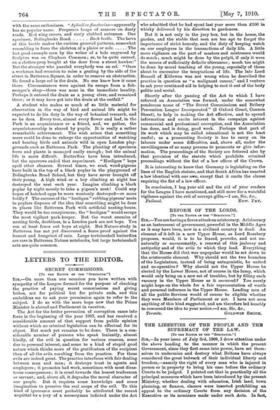LETTERS TO THE EDITOR.
SECRET COMMISSIONS.
[To THE EDITOR OP THE "SPECTATOR."
SIR,—On more than one occasion you have written with sympathy of the League formed for the purpose of checking the practice of paying secret commissions and giving bribes, not for political but for private ends, and this emboldens me to ask your permission again to refer to the subject. I do so with the more hope now that the Prime Minister is abroad and Parliament in vacation.
The Act for the better prevention of corruption came into force in the beginning of the year 1907, and haii received a considerable amount of that support from public opinion without which no criminal legislation can be effectual for its object. But much yet remains to be done. There is a con- siderable number of persons who speak leniently, almost kindly, of the evil in question for various reasons, some due to personal interest, and some to a kind of stupid good nature which thinks more of the gratification of the recipient than of all the evils resulting from the practice. For these evils are indeed great. The practice interferes with fair dealing between man and man; it destroys trust in agents and employees ; it promotes bad work, sometimes with most disas- trous consequences; it is cruel towards the honest tradesman or servant; and, above all, it degrades the moral character of our people. But it requires some knowledge and some imagination to perceive the real scope of the evil. To this kind of ignorance must probably be attributed the recent acquittal by a jury of a nurseryman indicted under the Act who admitted that he had sj3ent last year more than £100 in whisky delivered by his direction to gardeners.
But it is not only in the jury box, but in the home, the garden, and the stable that men are too apt to forget the importance of strict honesty, and the duty of keeping watch on our employees in the transactions of daily life. A little more vigilance on the part of masters and mistresses would do much ; much might be done by the pulpit, if only it were the source of sufficiently definite utterances ; much too might be done by moral teaching of the young, especially of those about to encounter the temptations of life. The late Lord Russell of Killowen was not wrong when he described the practice in question as "a malignant cancer," and I venture to ask your continued aid in helping to root it out of the body politic and social.
Shortly after the passing of the Act to which I have referred an Association was formed, under the somewhat ponderous name of "The Secret Commissions and Bribery Prevention League Incorporated" (3 Oxford Court, Cannon Street), to help in making the Act effective, and to spread information and excite interest in the campaign against commercial and professional corruption, and the Association has done, and is doing, good work. Perhaps that part of its work which may be called educational is not the least useful ; as a prosecuting Society it has to carry on its labours under some difficulties, and, above all, under the unwillingness of so many persons to prosecute or give infor- mation. The proceedings of the Society are fettered also by that provision of the statute which prohibits criminal proceedings without the fiat of a law officer of the Crown.
It is interesting to know that Germany is legislating on the lines of the English statute, and that South Africa has enacted a law identical with our own, except that it omits the clause requiring the fiat of a law officer.
In conclusion, I beg your aid and the aid of your readers for the League I have mentioned, and still more for a watchful vigilance against the evil of corrupt gifts.—I am, Sir, &c.,










































 Previous page
Previous page